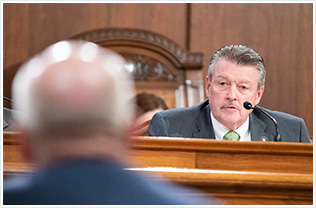Brewster Ties Extraction Levy to Environmental Protection, Education, Security Initiatives
A new plan to use revenue generated from an energy extraction tax to provide school funding, safety investments and environmental protection initiatives will soon be introduced by state Sen. Jim Brewster.
 “The ability to use a responsible energy extraction tax to fund worthwhile initiatives in education and environmental protection creates opportunities without undue burden on the industry,” Brewster said. “My plan not only invests revenue from a shale tax into basic education and school safety initiatives, it would also release millions to pay for new pipeline and safety inspectors, plus fund environmental cleanup. “The ability to use a responsible energy extraction tax to fund worthwhile initiatives in education and environmental protection creates opportunities without undue burden on the industry,” Brewster said. “My plan not only invests revenue from a shale tax into basic education and school safety initiatives, it would also release millions to pay for new pipeline and safety inspectors, plus fund environmental cleanup.
“The plan would not affect the impact fee payments that now go to local governments.”
Brewster said his plan would place a five percent severance tax on the value of gas extracted at the well head. While the local impact fee would remain in place, gas drillers could deduct what they pay in impact fee monies against what severance taxes they owe.
The McKeesport lawmaker said the extraction tax would raise approximately $502 million per year. Minus the $230 million in impact fee payments to local governments, the remaining $272 million would be evenly split between education and environmental protection initiatives.
“Tying extraction revenue to specific uses ensures transparency and validates the tax,” Brewster said. “Revenue generated will not be wasted.”
Brewster said the estimated $136 million raised for education would be used to increase subsidies to public schools and improve school safety and security. He said the increased subsidy payments could help local school boards reduce or hold the line on property taxes.
The other $136 million would pay for a concerted effort to improve pipeline safety and address environmental issues. Ten percent of allotted environmental funds would be used to facilitate more pipeline safety inspectors. Another 10 percent would be earmarked towards increasing staffing at the Pennsylvania Department of Environmental Protection (DEP). Eighty percent of environmental funding would be used for various environmental cleanup programs across the state.
Brewster has introduced a version of the plan in previous sessions. In the 2015-2016 session, he authored Senate Bill 395.

 Stay Connected
Stay Connected
For updates on this and other legislative initiatives, stay in touch with me on the Internet through my website, twitter, or on Facebook. |
